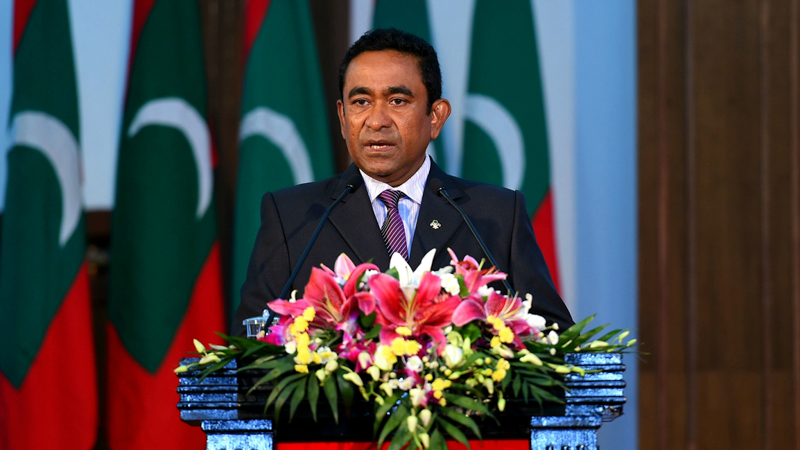Citing irregularities and rights violations in the terrorism trial of former president Mohamed Nasheed, the Prosecutor General has announced today that he will appeal the criminal court’s verdict.
The decision comes amidst rumors that President Abdulla Yameen will pardon the opposition leader ahead of July 26, the day Maldives marks 50 years of independence from the British.
In a brief statement issued at 6pm, PG Muthaz Muhsin said: “As various parties are raising questions about how the trial proceeded, and as Mohamed Nasheed has said his rights were violated, and that he did not have sufficient time to prepare for the case, and that he did not receive the case documents for an appeal, and since Mohamed Nasheed has asked the prosecutor general to appeal the case, the Prosecutor General’s office has decided to appeal the terrorism conviction against Mohamed Nasheed at the Maldives’ High Court under authority granted to the prosecutor general by article 233(i) of the Maldives’ constitution.”
Article 233 authorises the PG to appeal any judgment, verdict or decision in a criminal matter.
It may take days for the appeal to begin with state offices closed until July 29 for independence day celebrations. The criminal court will now have to issue a trial record and the High Court registrar will then make a decision on accepting the appeal.
Nasheed was found guilty on terrorism charges over the military’s detention of criminal court chief judge Abdulla Mohamed in January 2012.
Ibrahim ‘Ibu’ Mohamed Solih, MP of the main opposition Maldivian Democratic Party (MDP), said he could not comment as Nasheed’s lawyers were presently discussing the development.
The Attorney General Mohamed Anil today dampened talk of an imminent pardon for Nasheed saying: “Such matters will be dealt with through established procedures in the criminal justice system… It will not happen without my knowledge. I have not received any information yet.”
On June 20, President Yameen rejected Nasheed’s appeal for clemency, urging him to exhaust all appeal processes first. The opposition leader’s lawyers say that the Clemency Act grants the president the discretion, on the president’s own initiative, to commute the sentence of any individual convicted of a criminal offence.
The next day, Nasheed was transferred to house arrest for eight weeks.
The MDP and the government subsequently began talks on clemency for Nasheed and other jailed politicians and withdrawal of charges against some 1,400 opposition supporters.
The opposition has backed several government proposals in hope of freedom for Nasheed, including the impeachment of vice president Dr Mohamed Jameel and a constitutional amendment setting new age limits for the presidency and vice presidency. The amendment allowed President Yameen to replace Jameel with the influential tourism minister Ahmed Adeeb.
The MDP also issued a free whip on a second constitutional amendment to allow foreign freeholds in the Maldives. Some 19 opposition MPs, including ten MDP MPs, voted to pass the amendment.
At the fourth meeting of talks last week, Ibu had suggested that Nasheed may be released before July 26.
The UN working group on arbitrary detention is expected to rule on Nasheed’s imprisonment in September or October. In a response to the UN, the government insisted Nasheed must appeal the sentence.
The opposition leader’s lawyers maintain they have no legal avenue to file an appeal as the Supreme Court had shortened a 90-day appeal period to 10 days, weeks before Nasheed’s trial began.
The High Court, citing lateness, last month rejected an appeal filed by the Prosecutor General over a murder acquittal. Public prosecutors blamed the delay on the criminal court’s failure to issue a trial record, as had happened in Nasheed’s case.
Meanwhile, the Supreme Court last week acquitted a convicted drug trafficker citing irregularities similar to that raised by Nasheed’s lawyers.
In the unprecedented ruling, the apex court said the accused was not given access to a lawyer or the opportunity to call defence witnesses.
In a separate development, only four of the nine High Court judges are eligible to hear Nasheed’s appeal. This is because of two factors; three judges were transferred to a newly created appellate court branch in the south on June 23 and two of the three presiding judges in Nasheed’s prosecution were promoted on June 8 to fill two vacancies at the High Court.
Since the Judges Act states that an odd number of judges must preside over appeals, Nasheed’s appeal can still proceed with three judges.
An appeal filed by ex-defence minister Mohamed Nazim was stalled at the High Court when the Supreme Court transferred judges overseeing his appeal to the southern branch.
UK Prime Minister David Cameron, the European parliament, and influential US Senators have called for Nasheed’s immediate release.
Reporting by Ahmed Naish and Shafaa Hameed. Writing by Zaheena Rasheed.


